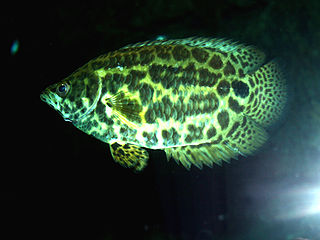Engraulicypris is a genus of freshwater ray-finned fish belonging to the family Danionidae, the danionins or danios. This genus is classified in the subfamily Chedrinae and the species in the genus are endemic to Africa. In a study of mitochondrial genealogy, the species formerly included in Mesobola are not phylogenetically separated from Engraulicypris and therefore should also be included in Engraulicypris.

Dermatolepis is a genus of marine ray-finned fish, groupers from the subfamily Epinephelinae, part of the family Serranidae, which also includes the anthias and sea basses. They are found in the western Atlantic, Pacific and Indian Oceans.

Zacco is a genus of small freshwater ray-finned fishes belonging to the family Xenocyprididae, the East Asian minnows or sharpbellies. They are found in freshwater habitats in China and northern Vietnam. The generic name Zacco derives from the Japanese Zako雑魚.

Ctenopoma is a genus of climbing gouramies native to Africa. Microctenopoma has been included in Ctenopoma in the past; in contrast to that genus, Ctenopoma species are egg scatterers with no parental care.

Heteromormyrus is a genus of freshwater ray-finned fishes belonging to the family Mormyridae, the elephantfishes. These fishes are found in southern and central Africa in Angola, Namibia, the Democratic Republic of the Congo and, maybe, Zimbabwe.

Microthrissa is a genus of freshwater ray-finned fishes belonging to the family Dorosomatidae, which also includes the gizzard shads and sardinellas. The species in this genus are endemic to Africa.

Odaxothrissa, the fangtooth pellonulines, is a genus of fresh-water fish in the family Dorosomatidae. All the extant species in this genus are found in tropical Africa.
Glaniopsis is a small genus of loaches endemic to the island of Borneo.

Bangana is a genus of fish in the family Cyprinidae, the carps and minnows. It is distributed across much of southern and eastern Asia. Species live mainly in the flowing waters of tropical and subtropical rivers.
Pseudohemiculter is a genus of freshwater ray-finned fish belonging to the family Xenocyprididae, the East Asian minnows or sharpbellies. The four species in this genus are found in eastern Asia.
Leptocypris crossensis is a species of freshwater ray-finned fish belonging to the family Danionidae. This fish is found in the Cross, Wouri and Sanaga River basins in Cameroon and Nigeria.
Leptocypris guineensis species of freshwater ray-finned fish belonging to the family Danionidae. This fish is found in Atlantic slope drainages of the Guinean mountain ranges.
Leptocypris konkoureensis is a species of freshwater ray-finned fish belonging to the family Danionidae. This fish is endemic to the Kakrima River in Guinea.
Leptocypris lujae is a species of freshwater ray-finned fish belonging to the family Danionidae. This fish is found in the Congo River up to the Lualaba River in the Democratic Republic of Congo and the Central African Republic.
Leptocypris modestus is a species of freshwater ray-finned fish belonging to the family Danionidae. This fish is found in Congo River in the Democratic Republic of Congo and the Central African Republic. It is the type species of the genus Leptocypris.

The Nile minnow is a species of freshwater ray-finned fish belonging to the family Danionidae. This fish is found in the Nile, Omo, Niger, Bénoué, Volta, and Senegal Rivers, and the Lake Chad basin. It was described by Léon-Daniel de Joannis in 1835.
Leptocypris taiaensis is a species of freshwater ray-finned fish belonging to the family Danionidae. This fish is endemic to Taia River, Little Scarcies River and Waanje River in Sierre Leone.
Leptocypris weeksii is a species of freshwater ray-finned fish belonging to the family Danionidae. This fish is found in the lower Congo River, the central and upper Congo River basin, and Pool Malebo in the Democratic Republic of Congo.
Leptocypris weynsii s a species of freshwater ray-finned fish belonging to the family Danionidae. This fish is found in the lower, central and upper Congo River basin and Pool Malebo in the Democratic Republic of Congo and the Central African Republic.
Chedrinae, the troutbarbs, is a subfamily of freshwater ray-finned fishes belonging to the family Danionidae, the danionins or danios. The fishes in thus subfamily are found in Asia and Africa.








